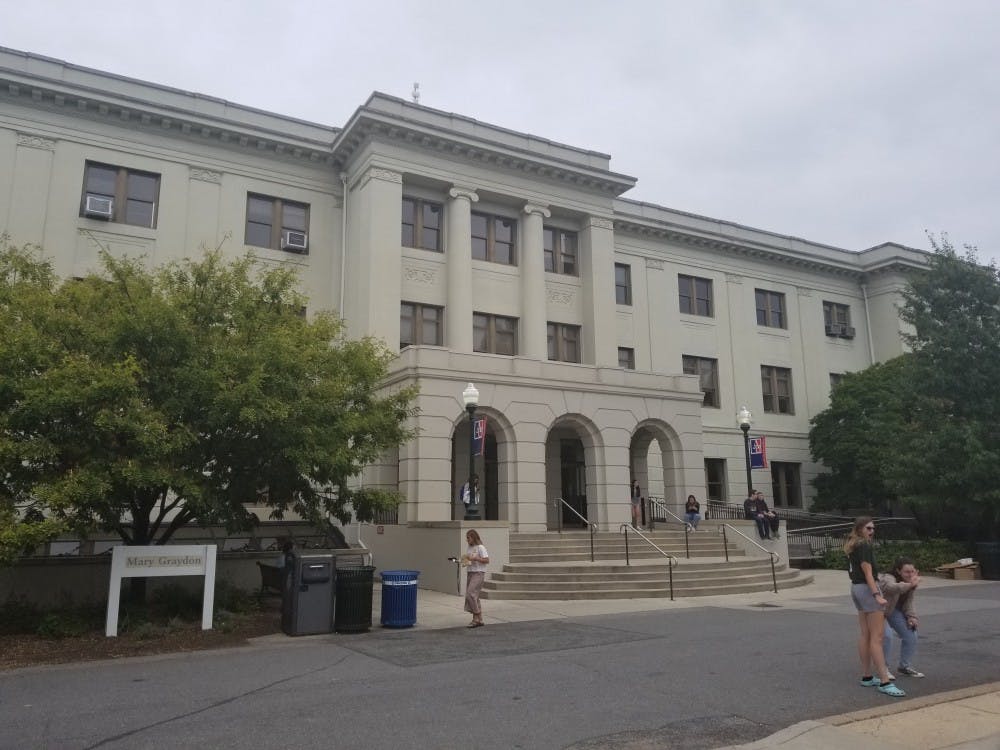Editor's note: The subject of this article's name has been changed to "student" since it was first published after he decided he does not want to disclose his transgender identity, in part because he fears for his safety as a trans man. His photo has also been removed from the story.
A former American University student has raised over $4,000 to pay his outstanding bills to the University after being cut off financially from his parents for coming out as transgender.
The student moved from Pittsburgh to Washington in the summer of 2016 to attend AU. At the end of his freshman year, he came out to his friends as a transgender man, and shortly after, he began his transition and legally changed his name. His education came to a halt, however, when he came out to his parents as transgender in the fall of 2017.
“They said that I could either go home and stop transitioning, or go through the equivalent of conversion therapy to make me not trans, or at least stop hormones, or else they would stop paying for my school,” he said. “I didn’t have any other choice but to say that I’m not stopping.”
Up until coming out, the student's parents helped him pay his tuition, and the student said he recognizes that his parents’ help was “definitely a privilege.” However, after finishing his third and last semester at AU without financial support, he had a remaining balance of $4,500 that he was unable to pay on his own. Consequently, the student could not continue at AU for the next semester and enroll in classes until the balance was paid off.
“I only had some money saved up but I didn’t have anywhere to go, so I ended the semester and was living off campus,” the student said. “Luckily, my friend let me move in with him for free for a month until I got a full-time job and was able to support myself.”
The student said he was completely locked out of Eagle Service and has been unable to access his transcripts until he pays off the balance, putting his life and education on hold. He therefore started a GoFundMe page in an attempt to raise money, and the response that he received from the public was overwhelmingly positive, the student said.
“It was an extremely positive response that I was not expecting at all,” the student said. “I didn’t think people would react negatively, but in two days I had already raised almost $3,500. I was shocked, overwhelmed and really appreciative.”
The response that the student received from AU’s financial aid office was not as helpful, he said. After losing financial support from his parents, the student went to the office to explain his situation and seek help, and he said he was almost immediately told to transfer.
“They basically said that even if I was able to get all the financial aid that FAFSA [Free Application for Federal Student Aid] could offer, and that AU could offer, I still wouldn’t be able to afford to go to AU,” the student said. “They didn’t make any efforts to try to get me to stay. There was no effort at all.”
The student also unsuccessfully tried to get the money he owed excused due to “extraneous circumstances.” He also contacted the Center for Diversity and Inclusion for assistance but said they were unhelpful as well.
AU recently created the Kerwin Family Emergency Financial Aid Fund, which aims to assist "students in unexpected circumstances, allowing them to complete their studies while giving the university the agility to respond to changing student need," according to American Magazine, AU’s alumni magazine. The student was not told about the fund by administrators and said he had never heard of it.
Due to the Family Educational Rights and Privacy Act, AU director of strategic communications Mark Story said he could not discuss the circumstances of individual students. He added that AU is “required to abide by the Title IV laws established by the federal government regarding financial aid.”
“These laws provide very limited discretion for universities to make professional judgments based on extenuating circumstances,” Story said.
When students experience extenuating circumstances that change their financial aid information, they can appeal for re-evaluation of their financial aid, Story said, and federal laws mandate how appeals are processed. Ultimately, AU does not make the rules, Story said -- federal law does.
“It’s really frustrating because I think that AU should have some sort of policy for when things like this happen, or at least some way to help those students,” the student said.
Once the student is able to pay off the remaining balance to AU, he hopes to pursue his degree online and become a therapist while working full-time. However, he expects to face financial obstacles down the road as he re-applies for federal financial aid through the FAFSA.
“One of the problems with FAFSA is that it assumes that everyone under 25 is under the care of their parents, so if you want to claim yourself as independent, it’s practically impossible unless you were disowned as a child,” the student said.
When the student transfers schools, he will have to prove that he does not get any financial support from his parents, and according to a counselor that he is currently speaking to at another university, this is very difficult to do.
“That is another problem that needs to be addressed,” the student said. “There should be a way to claim yourself as independent.”





